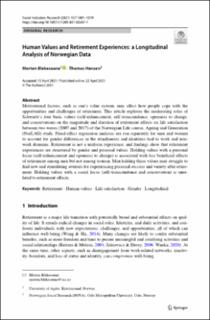Human values and retirement experiences: A longitudinal analysis of Norwegian data.
Peer reviewed, Journal article
Published version
Date
2021-04-22Metadata
Show full item recordCollections
Original version
Social Indicators Research. 2021, 157 1001-1019. https://doi.org/10.1007/s11205-021-02687-7Abstract
Motivational factors, such as one’s value system, may affect how people cope with the opportunities and challenges of retirement. This article explores the moderating roles of Schwartz’s four basic values (self-enhancement, self-transcendence, openness to change, and conservation) on the magnitude and duration of retirement effects on life satisfaction between two waves (2007 and 2017) of the Norwegian Life course, Ageing and Generation (NorLAG) study. Fixed-effect regression analyses are run separately for men and women to account for gender differences in the attachments and identities tied to work and non-work domains. Retirement is not a uniform experience, and findings show that retirement experiences are structured by gender and personal values. Holding values with a personal focus (self-enhancement and openness to change) is associated with less beneficial effects of retirement among men but not among women. Men holding these values may struggle to find new and stimulating avenues for experiencing personal success and variety after retirement. Holding values with a social focus (self-transcendence and conservation) is unrelated to retirement effects.

